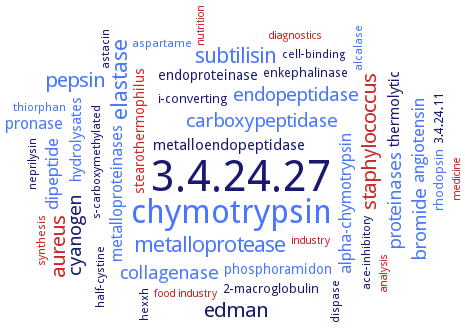3.4.24.27: thermolysin
This is an abbreviated version!
For detailed information about thermolysin, go to the full flat file.

Word Map on EC 3.4.24.27 
-
3.4.24.27
-
chymotrypsin
-
elastase
-
metalloprotease
-
subtilisin
-
staphylococcus
-
edman
-
pepsin
-
aureus
-
carboxypeptidase
-
endopeptidase
-
bromide
-
cyanogen
-
collagenase
-
proteinases
-
dipeptide
-
angiotensin
-
pronase
-
metalloproteinases
-
alpha-chymotrypsin
-
thermolytic
-
hydrolysates
-
metalloendopeptidase
-
stearothermophilus
-
endoproteinase
-
phosphoramidon
-
i-converting
-
enkephalinase
-
rhodopsin
-
2-macroglobulin
-
3.4.24.11
-
cell-binding
-
alcalase
-
ace-inhibitory
-
hexxh
-
dispase
-
aspartame
-
thiorphan
-
neprilysin
-
s-carboxymethylated
-
half-cystine
-
astacin
-
synthesis
-
industry
-
nutrition
-
food industry
-
diagnostics
-
medicine
-
analysis
- 3.4.24.27
- chymotrypsin
- elastase
- metalloprotease
- subtilisin
- staphylococcus
-
edman
- pepsin
- aureus
- carboxypeptidase
- endopeptidase
- bromide
-
cyanogen
- collagenase
- proteinases
- dipeptide
- angiotensin
- pronase
- metalloproteinases
- alpha-chymotrypsin
-
thermolytic
- hydrolysates
- metalloendopeptidase
- stearothermophilus
-
endoproteinase
- phosphoramidon
-
i-converting
- enkephalinase
- rhodopsin
-
2-macroglobulin
-
3.4.24.11
-
cell-binding
- alcalase
-
ace-inhibitory
-
hexxh
-
dispase
- aspartame
- thiorphan
- neprilysin
-
s-carboxymethylated
-
half-cystine
- astacin
- synthesis
- industry
- nutrition
- food industry
- diagnostics
- medicine
- analysis
Reaction
preferential cleavage: -/-Leu > -/-Phe =
Synonyms
Bacillus thermoproteolyticus neutral proteinase, EC 3.4.24.4, hspA, LIC13322, Neutral metalloproteinase, NprM, protease type X, proteinase type X, Proteinase, Bacillus thermoproteolyticus neutral, protex 14L, Thermoase, thermoase PC10F, Thermoase Y10, thermolysin, thermolysin-like protease, Thermostable neutral proteinase, TL, TLN, TLP, TLP-ste
ECTree
Advanced search results
Purification
Purification on EC 3.4.24.27 - thermolysin
Please wait a moment until all data is loaded. This message will disappear when all data is loaded.
by Gly-D-Phe affinity chromatography, coupling to the resin by epichlorohydrin, 1,4-butandiol diglycidyl ether, or 1,6-hexanediol diglycidyl ether, method optimization and evaluation, overview
-
commercial enzyme powder further purified to remove salts
evaluation of Gly-D-Phe, Gly-L-Leu, and D-Phe as affinity ligands for thermolysin, each of the ligands is immobilized to a resin. The optimum pH for adsorption of thermolysin is pH 5.0 to pH 6.0 for each of the ligands, affinity chromatography method development, adsorption isotherms, overview
-
expression as single polypeptide pre-proenzyme in Escherichia coli, secretion into medium as mature enzyme
-
incubation of impure enzyme at 37°C causes proteolysis of impurities, whereas the protease remains active and uncleaved
-
mobile phase effects in the high-performance affinity purification
-
native enzyme to homogeneity from the culture supernatant by ammonium sulfate fractionation, anion exchange chromatography, gel filtration
recombinant enzyme, different methods, e.g. by Gly-D-Phe or bacitracin affinity, ion exchange, and hydrophobic interaction chromatography, gel filtration and ammonium sulfate fractionation, detailed overview
-
recombinant extracellular wild-type and mutant enzymes from Bacillus subtilis culture medium by ammonium sulfate fractionation, hydrophobic interaction chromatography, and gel filtration
-
recombinant mature wild-type and mutant enzymes 7.2-11fold from Escherichia coli by hydrophobic interaction and affinity chromatography
recombinant wild-type and mutant enzymes from Escherichia coli K12 strain JM109 by hydrophobic interaction and Gly-D-Phe affinity chromatography
-
recombinant wild-type and mutant enzymes from Escherichia coli K12 strain JM109 to homogeneity by Gly-D-Phe heat treatment at 60°C for 20 min, affinity chromatography and gel filtration


 results (
results ( results (
results ( top
top





